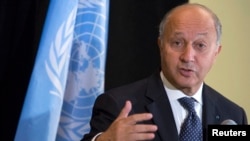France says talks are progressing on a United Nations Security Council resolution dealing with Syria's chemical weapons, including the key sticking point of requiring coercive measures to ensure compliance.
Foreign Minister Laurent Fabius, who took part in a meeting of the five veto-wielding powers, said Thursday that "three of France's demands have been met."
He said the text will include a reference to the U.N. Charter's Chapter VII, which authorizes possible further action for non-compliance. Russia - Syrian President Bashar al-Assad's main ally - has resisted references to Chapter VII, which includes military and non-military action to enforce decisions.
France has also demanded accountability for crimes in Syria and language calling the use of chemical weapons an attack on international security, which would give the Security Council power to act.
But Fabius said "some issues still need to be clarified" before adoption of a resolution on ending Syria's chemical arsenal.
In comments broadcast late Wednesday, Assad told Venezuela's Telesur television he is not ruling out a U.S. military strike on his country, despite agreeing to a deal requiring him to give up his chemical weapons.
President Assad said his government remains committed to the U.S.-Russian deal, which emerged after the U.S. threatened airstrikes to punish his government for a poison gas attack last month on a rebel-held area that killed hundreds.
Assad denies carrying out the attack.
The U.S. delayed the airstrikes after Assad agreed to the deal. But the Syrian leader told Telesur that the possibility of what he called U.S. "aggression" was always there, whether the "pretext" was chemical weapons or "something else."
His comments came as U.N. chemical weapons inspectors returned to Syria to investigate multiple incidents where chemical weapons were allegedly used.
The team of experts, led by Swedish chief Ake Sellstrom, has already determined that the deadly nerve agent sarin was used in the August 21 attack near Damascus. The team's mandate does not include assigning blame for any of the attacks.
Foreign Minister Laurent Fabius, who took part in a meeting of the five veto-wielding powers, said Thursday that "three of France's demands have been met."
He said the text will include a reference to the U.N. Charter's Chapter VII, which authorizes possible further action for non-compliance. Russia - Syrian President Bashar al-Assad's main ally - has resisted references to Chapter VII, which includes military and non-military action to enforce decisions.
France has also demanded accountability for crimes in Syria and language calling the use of chemical weapons an attack on international security, which would give the Security Council power to act.
But Fabius said "some issues still need to be clarified" before adoption of a resolution on ending Syria's chemical arsenal.
In comments broadcast late Wednesday, Assad told Venezuela's Telesur television he is not ruling out a U.S. military strike on his country, despite agreeing to a deal requiring him to give up his chemical weapons.
President Assad said his government remains committed to the U.S.-Russian deal, which emerged after the U.S. threatened airstrikes to punish his government for a poison gas attack last month on a rebel-held area that killed hundreds.
Assad denies carrying out the attack.
The U.S. delayed the airstrikes after Assad agreed to the deal. But the Syrian leader told Telesur that the possibility of what he called U.S. "aggression" was always there, whether the "pretext" was chemical weapons or "something else."
His comments came as U.N. chemical weapons inspectors returned to Syria to investigate multiple incidents where chemical weapons were allegedly used.
The team of experts, led by Swedish chief Ake Sellstrom, has already determined that the deadly nerve agent sarin was used in the August 21 attack near Damascus. The team's mandate does not include assigning blame for any of the attacks.





